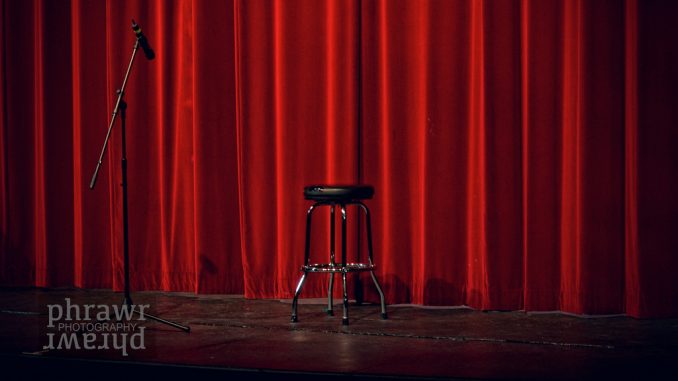
A platform stage illuminated by Christmas lights with a vintage microphone, tambourine, violin, acoustic and electric guitars sat in the front of the Nadia and Max Shepard Recital Hall. Two women and a gentleman, referring to themselves as Saint Rita, appeared and joined together to play the music of Kurt Weill.
Kurt Weill (1900-1950) was a 20th century German musical theater composer whose work was influenced by post-romanticism and expressionism. Weill came to the United States after Hitler’s ascent into power in 1933, which forced him to leave and never return. He relocated to Paris, France and later lived in Rockland County outside of Nyack, New York until his death.
Mainly known for his operas, such as The Threepenny Opera and Rise and Fall of the City of Mahagonny, most people would recognize his music, like “Alabama Song,” which was covered by many artists, including The Doors.
Formed in summer 2016, the trio consists of Kelly Ellenwood, a faculty member at SUNY New Paltz, soprano and award-winning actor who’s performed on and off Broadway; Kathleen Bosman, a freelance violinist who’s worked with musicians such as Yo-Yo Ma and Joshua Bell; as well as Stephen Clair, a critically-acclaimed songwriter, recording artist and founder of the Beacon Music Factory.
“There’s a theme of being lost and there’s a lot of reasons why we chose that, but not the least of which, but Saint Rita is the patron saint of lost causes and we named the group as an homage to Edith Piaf,” Ellenwood explained. “Originally we were going to do a lot more Piaf, but somehow Kurt Weill took us and we rolled with it.”
Ellenwood had lost her voice a few years ago to a serious illness and never thought she’d be able to sing again. Since then, she’s started to overcome this obstacle, Ellenwood dedicated a part of the performance to “finding her way back.” Arranging the music for all of their parts was difficult and they’re still working on perfecting it.
They picked music from the three periods of Weill’s life: his period in Germany working industrially on instrumental music and writing his first operas, the time he spent in France collaborating with Bertolt Brecht and his American period, where he wrote many musicals and music for films.
“This isn’t easy music in its configuration because we had to do all of the arrangements; it’s very terse and spare and we’re still working through a lot of it,” Ellenwood said. “[This performance] was a big deal for us because we got to do it all at once.”
Almost all of the 12 songs performed were either newly composed or modeled off of another arrangement. However, one of the challenges they faced was finding key signatures that worked for Ellenwood’s vocal range, which took them some time to figure out. Some of the pieces, such as “Youkali,” are supposed to be sung in French, but Ellenwood chose to translate it to English.
“Normally, like in the first song we did, I would sing a lot higher than that. I could sing a high D and come back all the way down two octaves and I can’t even do that anymore,” Ellenwood said. “We had to change things up.”
Saint Rita was supposed to perform in October 2016, but Ellenwood got sick and they did not rehearse again until January 2017.
“Weill’s very interesting because he’s sort of this crazy crossover — is it classical music? Is it popular music?” Ellenwood said. “There’s only two kinds of music: good music and bad music. His music has been covered by everybody. I’ve always loved this music. I’ve always had that range at my fingertips, the lower range, but now it just feels good.”
